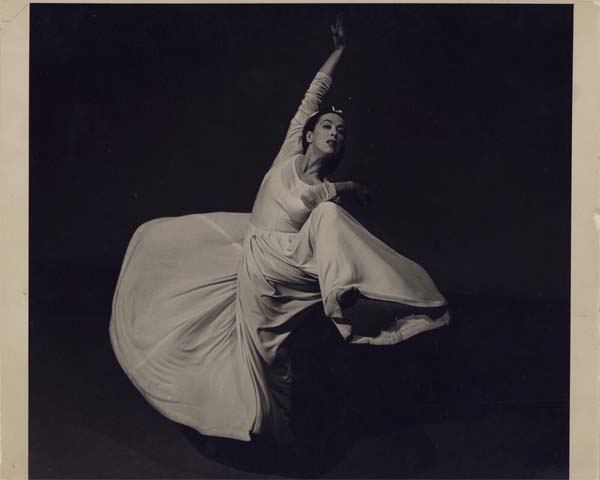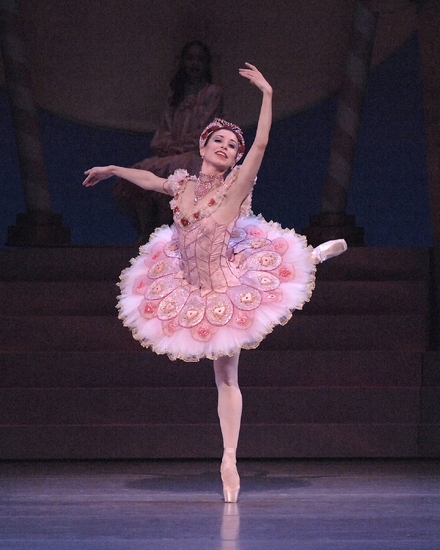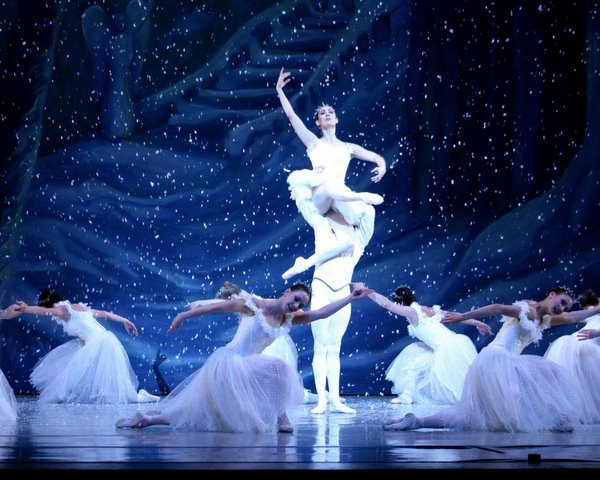Last weekend, I had the privilege to attend a Martha Graham performance, with dinner and a lecture beforehand all for $15. Â I was more than willing to scrape fifteen dollars together to see a dance performance by a company founded by the Andy Warhol of dance, Martha Graham. Â A household name that I have known for years and years, without really knowing about her contributions to her art.
This was an offer I couldn’t refuse.
Having never been to a modern dance performance, and having little knowledge about modern dance in general, I wasn’t sure what to expect (although I had heard something about a large, gray sock…).

But the lecture prior to the performance shed a lot of light on one of the few artistic facets of modernism that piques my interest.
A few key things that I kept tucked away in my mind about Martha Graham was that she did not add male dancers to her company until several years after its inception. Â This female-centricity was extremely foreign to me, compared to the historically male-dominated world of theater.

This was because many of her pieces are centered around female psychology and the female gaze (e.g. ‘Night Journey’ which I saw later that night).
Aesthetically, Martha Graham’s dancers place a heavy emphasis on gravity.

They do not always point their toes or convey a sense of lightness when they are in the air. Â Instead, their limbs are contorted and broken to convey the weight of gravity and the human body.
“Huh,” I was thinking, “That doesn’t bother me. Â Or does it?” Â I’m not a pointed toe nazi. Â But I wondered how this heaviness would effect me later on.
Musically, something I found very interested and was a little afraid to experience, was the fact that Martha Graham’s dancers always dance a little bit ahead of the music. Later on, I found that this out-of-sync movement did exactly what Martha Graham wanted it to do, it made me focus on the movement of the dancers. It made me view them as moving entities unto themselves as opposed to visual expressions of beautifully composed music.
All throughout the dance professor’s lecture, she had everyone in attendance change their body position. Â She told us to stand up, sit down, lie down. Â Basically do anything we felt comfortable doing. Â Some people did lie down on the floor and when the professor was done with her lectured and everyone had changed positions multiple times, she asked us about the experience. Â I was amazed at how aware I became of my body and how it influenced the way my mind paid attention. Â Some of the attendees who laid on the floor commented on how much easier it was to pay attention to the speaker when they were allowed to be comfortable.
Once the lecture was over, we watched a short clip of Martha Graham getting ready in her dressing room, circa 1959 for her role as Jacosta in ‘Night Journey’.
When it came time for the actual performance, I was scared and excited. Â I didn’t know what to expect, besides contorted bodies, non-synchronized movement, and simple costuming, from what I had seen in publicity photos.
What proceeded was an amazing tour de force that made me marvel at everything the human body is capable of.
What surprised me most was how beautiful the dancing was.  Given that the Martha Graham company is a modern dance company, I was expecting something wretched or confusing.To be honest, I was sure how excited I was to see people contort their bodies out of time to music.  And there were times when I was confused, but it made me more engaged in the process of creation.
In the past, when I have been to ballet performances, I have loved the frilly, glittery costumes….

I have loved being taken to a fantasy land….

And I have loved being swept away by the beauty of Tchaikovsky’s music and Marius Petipa’s choreography.
Martha Graham was not Marius Petipa.
And I didn’t spend the entire performance reveling in candy drop ecstasy. Â In fact, most of the time I was uncomfortable and constantly asking questions. Â I asked myself questions like, “Why don’t I move like this more in my every day life? Â Why don’t I express myself with my whole body instead of just my facial muscles?”
There were some scenes that expressed such raw emotion, I wondered why no one had ever tapped into this emotion before.
The company performed several pieces by other choreographers (one of which, was my favorite of the night) but my favorite Martha Graham composition was definitely ‘Night Journey’ which is a psychological examination into the emotions of Jacosta after she realizes that she has slept with her son Oedipus. On an average day, incest does not sound like a great premise of a story to me.
But when danced by the Martha Graham company, this story became something that illuminated my emotional interior.  Although I did not relate to the characters’ incestuous relationship, I found that I did relate to the emotions of Jacosta.  Who hasn’t regretted something they’ve done and wanted to kill every object related to that horrible memory? And it was a journey. At the start, Jacosta is enthralled with Oedipus…

But after finding out that she has just spent the night with her own son, Jacosta is dumbstruck and horrified. Â She runs across the stage, staggering to catch herself from falling deeper into madness. Â It gets pretty intense.
After the emotional and psychological confrontation of ‘Night Journey’, my other favorite component of the performance was three variations on Graham’s original ‘Lamentation’ piece (arguably her most famous piece).
The first variation was comprised of three male dancers and one female, all in nude skin-tight costumes that showcased their bodies and movement in ways that glittery tutus never would.

The second variation was a solo. Â A woman in a black dress spent most of her time alternating between avoiding and reaching towards a banner of light from the side of the stage. Â The attention was almost exclusively on her torso; on the way she arched her back away from the light and then strenuously crouched forward as if her soul couldn’t bear the weight of her shoulders any more.
Last in the ‘Lamentation Variations’ was a piece that used the entire company performed, dressed in street clothes. Â Slowly the whole company crumbled to the floor until only one couple was standing and grasping on for dear life.

As a whole, I was very engrossed throughout the performance. Â It was very awkward at times. Â There were points where I didn’t know what to feel.
But it has left me thinking for days. Â Why wasn’t I able to reciprocate the dancer’s visceral performance with a more intuitive response? Â Is it because I have become so out of tune to instincts, so bent into shape by society’s emotional postures, and so sterilized by logic, that there are depths beneath my surface, that even I am unfamiliar with?
Lastly, I loved learning some biographical information about Martha Graham (including her romance with Erick Hawkins) and look forward to any future Martha Graham performances that I get the chance to see.



Leave a Reply
1 Comment on "Martha Graham Performance Review"
This is actually an amazing performance! I’m glad to see this kind of performance review as I’m usually confronted with the other ones ( http://feedback.tips ) 😉 This is way better though.